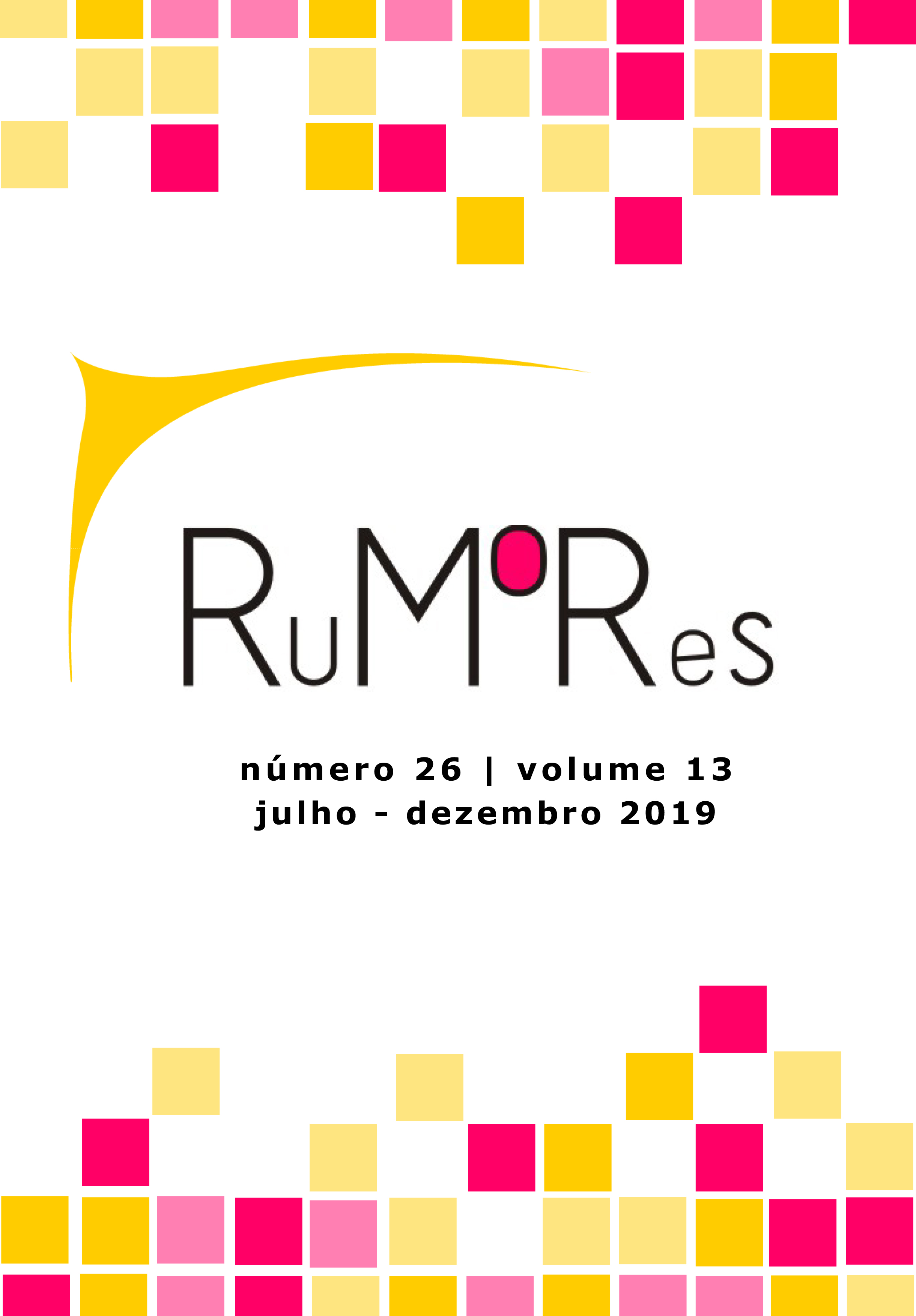New information technologies, scalability and quantitative and qualitative methods in human sciences
DOI:
https://doi.org/10.11606/issn.1982-677X.rum.2019.154201Keywords:
Research, new information technologies, quantitative and qualitative methods, Lev Manovich, Bruno LatourAbstract
This paper examines the assumptions that have guided the opposition between quantitative and qualitative methods in human and social sciences, focusing on the scalability aspect as an epistemological problem. It is about retaking some points of this debate regarding the new information technologies (NTI), focusing on the impact of large data production. Understanding method as research logic, the proposal retakes the discussions of Lev Manovich and Bruno Latour as a reference for a re-reading of the dichotomy between quantitative and qualitative methods in human and social sciences.
Downloads
References
BERRY, D. M. The computational turn: thinking about the digital humanities. Culture Machine, Sussex, v. 12, p. 1-22. 2011.
BLAIR, A. M. Too much to know: managing scholarly information before the Modern Age. New Haven: Yale University Press, 2010.
BURKE, P. Uma história social do conhecimento. Rio de Janeiro: Zahar, 2012.
CASTELLS, M. A sociedade em rede. São Paulo: Paz e Terra, 1999.
DURKHEIM, E. O suicídio: estudo de sociologia. São Paulo: Martins Fontes, 2011.
FREEMAN, L. C. The development of Social Network analysis. Vancouver: Empirical Press, 2004.
FOUCAULT, M. As palavras e as coisas: uma arqueologia das ciências humanas. São Paulo: Martins Fontes, 1981.
FULLER, M. (ed.). Software studies: a lexicon. Cambridge: The MIT Press, 2008.
GRAFTON, A. As origens trágicas da erudição: pequeno tratado sobre a nota de rodapé. Campinas: Papiros, 1998.
KITTLER, F. A verdade do mundo técnico: ensaios sobre a genealogia da atualidade. Rio de Janeiro: Contraponto, 2016.
KUHN, T. A estrutura das revoluções científicas. 5. ed. São Paulo: Perspectiva, 1997.
LATOUR, B. Gabriel Tarde and the end of the social. In: JOYCE, P. (ed.). The social in question: new bearings in history and the social sciences. Londres: Routledge, 2002. p. 117-132. Disponível em: https://bit.ly/2JUM9vl. Acesso em: 25 jan. 2019.
LATOUR, B. Tarde’s idea of quantification. In: CANDEA, M. (ed.). The social after Gabriel Tarde: debates and assessments. Londres: Routledge, 2010. p. 145-162. Disponível em: https://bit.ly/2kwMSH4. Acesso em: 29 jan. 2019.
LATOUR, B. Reagregando o social: uma introdução à Teoria do Ator-Rede. Bauru: Edusc; Salvador: Edufba, 2012.
LATOUR, B; VENTURINI, T. The social fabric: digital traces and quali-quantitative methods. In: PROCEEDINGS OF FUTURE EN SEINE, 1., 2009, Paris. Anais […]. Paris: Cap Digital, 2009. p. 87-101. Disponível em: https://bit.ly/1EkXFBc. Acesso em: 25 jan. 2019.
MANOVICH, L. A ciência da cultura? Computação social, humanidades digitais e analítica cultural. Matrizes, São Paulo, v. 9, n. 2, p. 67-83, 2015.
MANOVICH, L. The language of new media. Cambridge: The MIT Press, 2001.
MANOVICH, L. Trending: The promises and the challenges of big social data. Manovich.net, [S. l.], 2011. Disponível em: https://bit.ly/1KkzKHh. Acesso em: 25 jan. 2019.
MANOVICH, L. Trending: the promises and the challenges of big social data. In: GOLD, M. K. (ed.). Debates in the digital humanities. Minneapolis: University of Minnesota Press, 2012. p. 460-475. Disponível em: https://bit.ly/2m1vxpY. Acesso em: 25 jan. 2019.
MATOS, M. Metodologias qualitativas e quantitativas: de que falamos? Fórum Sociológico, Lisboa, v. 24, 2014. Disponível em: https://bit.ly/2kwOFfg. Acesso em: 25 jan. 2019.
MINAYO, M. C. S. O desafio do conhecimento: pesquisa qualitativa em saúde. Rio de Janeiro: Abrasco; São Paulo: Hucitec, 1996.
MCCARTHY, A. Do ordinário ao concreto: estudos culturais e a política de escala. Trama Interdisciplinar, São Paulo, v. 5, n. 3, p. 75-106, 2014.
RUPPERT, E. Social consequences of Big Data are not being attended to. [Entrevista cedida à] M. Carrigan. LSE Impact Blog, Londres, 2014. Disponível em: https://bit.ly/2kXgjSF. Acesso em: 25 jan. 2019.
SCHNAPP, J.; PRESNER, P. The digital humanities manifesto 2.0. Humanities Blast, Los Angeles, 2009. Disponível em: https://bit.ly/1HWvXgP. Acesso em: 2 out. 2018.
SMITH, J. K. Quantitative versus qualitative research: an attempt to clarify the issue. Educational Researcher, Nova York, v. 12, n. 3, p. 6-13, 1983.
URRY, J. Mobilities. Malden: Polity Press, 2008.
VARGAS, E. V. Multiplicando os agentes do mundo: Gabriel Tarde e a sociologia infinitesimal. Revista Brasileira de Ciências Sociais, São Paulo, v. 19, n. 55, p. 172-176, 2004.
Downloads
Published
Issue
Section
License
Declaro a total e irrestrita cessão de direitos autorais sobre o texto enviado para publicação na Rumores – Revista Online de Comunicação, Linguagem e Mídias. Entendo que o conteúdo do artigo é de minha inteira responsabilidade, inclusive cabendo a mim a apresentação de permissão para uso de imagens, ilustrações, tabelas, gráficos de terceiros que, porventura, venham a integrá-lo.









